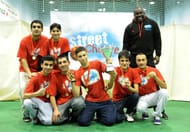Loud blaring music comes off the music consoles, draining the squeals and chatter of the kids in the playing arena which represents somewhat of a basketball sized court. There is lots of running and shouting as 15 year old Abbas gears up to bowl another ball. The tape covered tennis ball comes in at searing pace and rattles the plastic stumps of the batsman; 17 year old Daniel. There is mad cacophony as the other players; all clad in coloured T-shirts with the logo ‘StreetChance’ labeled on them, greet the bowler. The players are from multifarious backgrounds- from blacks, South Asians to youngsters affected by crime; all playing in one roof under the tutelage of StreetChance - a U.K. based initiative which uses cricket to engage young people from different strata – especially in areas affected by youth crime and anti-social behaviour.
What is it about?
StreetChance is the result of a five-way partnership between the charities Cricket Foundation and Cricket for Change, the British Home Office’s Positive Futures national crime prevention programme, the Metropolitan Police Service, and principal sponsor Barclays Spaces for Sport. Started in 2008, StreetChance commenced by taking community cricket projects into many of London’s less affluent boroughs and has now grown to involve various cities like Birmingham, Manchester, Bristol, and Dewsbury (south-west of Leeds). Richard Joyce, StreetChance’s national operations manager, says that by 2014 it will extend to many other areas as well.
StreetChance deliberately targets inner-city areas in the United Kingdom where children’s access to cricket clubs is very limited. The programme is focused on the promotion and development of cricket in these relatively deprived areas, and also on using cricket to engage with vulnerable and under-privileged young people. The concept is pretty simple; six-a-side matches can be played anywhere with a flat surface, including community centres. Wickets and bats generally tend to be plastic. The balls used are tennis ones and are wrapped in tape, borrowing from a similar style used in the Asian sub-continent.
Cricket in England is generally considered as the quintessential gentleman’s game; where spectators wearing formals enjoy the sport on a balmy evening; quite opposite of what StreetChance offers. That is one of the perceptions that it aims to change a little. Here kids of ages mainly comprising from 12-18 from mixed backgrounds play cricket that is not based on perfection or orthodoxy. StreetChance has a wide range of qualified coaches who look after the training aspects of the kids and many a volunteer willing to help conduct matches efficiently. It just lets the kids break free and enjoy the game without any barriers and allows them to enjoy each other’s company no matter where they are from. Played in enclosed areas, the initiative primarily aims to break boundaries of class, race as well as authority.
Its uniqueness lies in the fact that StreetChance mostly turns up in the rougher neighborhoods; where conventional cricket clubs are distant or appear inaccessible.
The positive effects
Jaffer Baloch, a 18 year old resident of Southwark, South East London, has been involved in StreetChance since it started in 2008. Though never involved in gangs himself, Jaffer has seen the negative influence it can have on people. He is thus very keen to fulfill his potential as a cricketer, and with StreetChance giving him the opportunity to keep playing all year round he feels it has helped give him a positive focus.
“StreetChance has truly changed me. It has helped to give me a bright future to look forward to,” says Jaffer. He adds further “I was never in a gang or anything, but I used to spend time hanging around the estate with troublemakers. There would have been a risk of getting into trouble because there was nothing better to do. Now I’ve moved away from the bad influences jamming on the estate and like to practice bowling at stumps in the hard court when I have some spare time.”
Other participants too recognize that StreetChance gives youngsters an avenue away from the gang and school rivalries that are common in inner-city London. Furthermore, it also allows them to mix with people from different backgrounds through a common zest of playing cricket.
One of the coaches looking over the kids is Perry Sophocleous. When Perry first got involved with StreetChance, his main focus was doing what he could to earn money. He was basically without any focus on where his career would lead him, but StreetChance changed it all.
“After college I was very unsure whether I wanted to go university or what job or career I wanted. This led me to get jobs for the sake of earning money in the short-term and didn’t lead anywhere. I started mixing with unsavoury people and developing the same mindset that they had. Working with ‘Cricket for Change’ on StreetChance has changed my view on how life should be lived.” says Perry .
The impact that StreetChance has already made can somewhat be gauged from the report published from Loughborough University in 2009, which stated that StreetChance is encouraging discipline and tolerance and helping to re-connect previously marginalized school pupils. The report also claims that the programme has helped counter the decline of cricket in state schools. Furthermore, many of the StreetChance participants have signed up with real clubs in the junior leagues.
Ways of functioning
One of the first places that StreetChance went initially was Priory Court (a community center in East London), which is known to have a heavy gang problem. Perry gradually noticed how teenagers with a heavy smoking and drinking problem started to cut down on their addictions after being involved with StreetChance.
An initiative of this scale however cannot be organized without the help of the local police. Hence, police engagement is also a very important part of StreetChance’s schemes. A member of the local Metropolitan Police is present at every StreetChance event. By means of an increased affinity developed with youngsters, local police have been able to use the chance to educate them on the “pitfalls and dangers” of criminal activity and enlighten them of the latest news on crime in the area to help them stay safe. Moreover, the police team has received information of anti-social behaviour and criminal damage in the immediate locality, directly from StreetChance participants’ own reports.
Says Police Community Support Officer (PCSO) Sean Herdman, “When we play cricket with the youngsters, we are on a level playing field, we are one of them. It’s great for young people to see the nice side of police, most of them will only see officers when things are going wrong. Playing cricket together lets them know we are approachable and we are normal human beings.”
There are many projects that StreetChance undertakes which runs the year round. Be it the many mixed community projects, the various estate projects and even one specially designed for girls. Like many of the participants are claiming, each project is now making a difference to someone involved in it.
The best thing about StreetChance according to Adil, a 17 year old participant from Hackney (a district within the metropolitan area of England) is that, “People from different communities and backgrounds put all things aside for their passion of playing cricket.”
The road ahead
For its future plans over the next few years, StreetChance aims to engage more than 16,000 young people, train and mentor more than 200 teachers, 250 local young coaches and volunteers, and to create more than 1,600 young leaders in schools, nationwide. It is slowly creating ripples everywhere as the local media is now highlighting its achievements and known cricketers like Wasim Akram from Pakistan and Graeme Swann from England, among others, are associating with it by giving the youngsters important tips while attending some of its sessions. In some good news that came their way, last year the Cricket Foundation received a £1 million National Lottery grant from Sport England, which has now enabled them to conduct StreetChance sessions for 16-24 year olds. This should come as a major boost to their motives.
The initiative’s next step is also to try and engage inmates of the remand prison a chance to improve their lives by engaging in StreetChance’s activities. One can only hope that it succeeds in its noble efforts.
At the most basic StreetChance is working in a very simple way. Its rationale is perhaps best understood in the simple words of Ronik, a 12 year old participant from Brent who enjoys StreetChance as it lets him “Being able to play cricket when I didn’t have the chance before.”
That is what StreetChance provides; a real and a second ‘Chance’ for everyone to get things right.
Brand-new app in a brand-new avatar! Download CricRocket for fast cricket scores, rocket flicks, super notifications and much more! 🚀☄️


